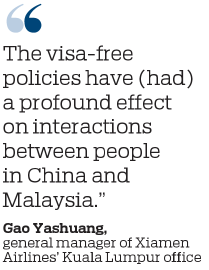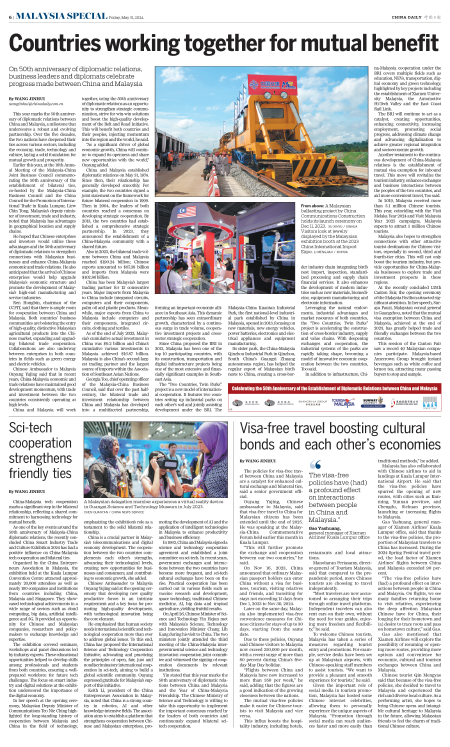
The policies for visa-free travel between China and Malaysia are a catalyst for enhanced cultural exchange and bilateral ties, said a senior government official.
Ouyang Yujing, Chinese ambassador to Malaysia, said that visa-free travel to China for Malaysian citizens has been extended until the end of 2025. He was speaking at the Malaysia-China Commemorative Forum held earlier this month in Kuala Lumpur.
"This will further promote the exchange and cooperation between our two countries," he said.
On Nov 16, 2023, China announced that ordinary Malaysian passport holders can enter China without a visa for business, tourism, visiting relatives and friends, and transiting for stays not exceeding 15 days from Dec 1, 2023 to Nov 30, 2024.
Later on the same day, Malaysia also implemented visa-free convenience measures for Chinese citizens for stays of up to 30 days, starting from the same date.
Due to these policies, Ouyang said Chinese visitors to Malaysia now exceed 250,000 per month, with a recent surge of more than 80 percent during China's five-day May Day holiday.
"Flights between China and Malaysia have now increased to more than 350 per week," he said, adding that the figures are a good indication of the growing closeness between the nations.
The mutual visa-free policies make it easier for Chinese tourists to visit Malaysia and vice versa.
This influx boosts the hospitality industry, including hotels, restaurants and local attractions.
Manoharan Periasamy, director-general of Tourism Malaysia, said that compared to the pre-pandemic period, more Chinese tourists are choosing to travel independently.
"Most travelers are now accustomed to arranging their trips through online travel platforms. Independent travelers can also rent cars on their own, without the need for tour guides, enjoying more freedom and flexibility," he said.
To welcome Chinese tourists, Malaysia has taken a series of measures regarding tourist entry and promotions. For example, service desks have been set up at Malaysian airports, with Chinese-speaking staff members to assist tourists. "We want to provide a pleasant and smooth experience for tourists," he said.
Given the important role of social media in tourism promotion, Malaysia has hosted some Chinese internet celebrities, allowing them to personally experience the unique aspects of Malaysia. "Promotion through social media can reach audiences faster and more easily than traditional methods," he added.
Malaysia has also collaborated with Chinese airlines to aid in landings at Kuala Lumpur International Airport. He said that the visa-free policies have spurred the opening of new routes, with cities such as Kunming, Yunnan province, and Chengdu, Sichuan province, launching or increasing flights to Malaysia.
Gao Yashuang, general manager of Xiamen Airlines' Kuala Lumpur office, said that thanks to the visa-free policies, the proportion of Malaysian travelers to China has increased. During the 2024 Spring Festival travel period, the load factor of Xiamen Airlines' flights between China and Malaysia exceeded 90 percent.
"The visa-free policies have (had) a profound effect on interactions between people in China and Malaysia. On flights, we see many families returning home to visit relatives, experiencing the deep affection Malaysian Chinese have for China, their longing for their hometown and (a) desire to trace roots and pass on hometown culture," said Gao.
Gao also mentioned that Xiamen Airlines will explore the possibility of resuming or opening more routes, providing more options and convenience for economic, cultural and tourism exchanges between China and Malaysia.
Chinese tourist Qin Mengyao said that because of the visa-free policies, she decided to travel to Malaysia and experienced the rich and diverse local culture. As a performing artist, she hopes to bring Chinese opera and intangible cultural heritage to Malaysia in the future, allowing Malaysian friends to feel the charm of traditional Chinese culture.

